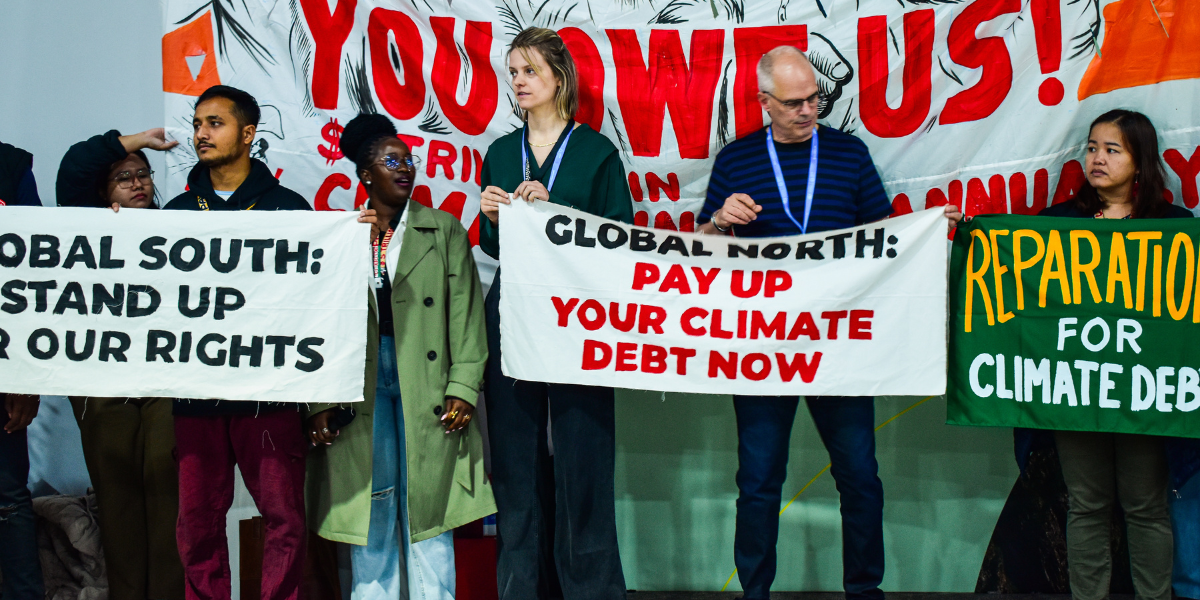This Jubilee Year, CIDSE travels to the UNFCCC Bonn Climate Conference as Pilgrims of Hope.
As global attention shifts toward the UNFCCC COP30 Climate Summit in Brazil, CIDSE—the international family of Catholic social justice organisations—arrives in Bonn for the UNFCCC 62nd Subsidiary Bodies Session in June with a powerful message: comprehensive debt relief is essential for achieving climate justice.
The June sessions, often referred to as the Subsidiary Bodies Meetings, come at a time of mounting global crises. Conflicts across multiple continents, economic instability, shrinking aid budgets, and the loss of Pope Francis—a key figure in climate leadership—form a challenging backdrop to the negotiations.
Yet amid these hardships, the Jubilee Year offers a powerful symbol of hope and renewal. In this spirit, CIDSE launches a new policy brief: “Climate Finance in the Jubilee Year: Why Debt Relief Is More Important Than Ever for Climate and Nature Justice.” The document calls on governments and international institutions to deliver urgent debt relief and enact far-reaching reforms to the global financial system.
“In this Jubilee Year, we speak not just as Zambians, but as part of a global family chained by debt and scorched by the fires of climate injustice,” said Edmond Kangamungazi of Caritas Zambia, a contributor to the policy brief. “We call on the world to remember: no nation should have to choose between serving its people and paying debts. Let this be the year we break the chains—where forgiveness becomes policy, not just prayer. Cancel the debts. Restore justice. Rebuild hope.”
Endorsed by more than 80 faith leaders and faith-based organisations worldwide, the brief sends a clear message: faith communities are united in demanding moral leadership from decision-makers, especially as COP30 will take place in Brazil, a majority-Christian nation.
As Catholic actors, CIDSE repeats the call for comprehensive debt relief and systemic reforms to the international financial architecture, to finally free countries most vulnerable to the climate crisis—and yet the ones that contributed the least—from the insidious debt-climate trap.
Lydia Machaka, Energy and Extractivism Officer at CIDSE and one of the co-authors states, “As we live the values of the Jubilee year, we must see it as
an opportunity to lead a spiritual reawakening and revolution—one that helps us understand the critical moment we are in and reflect on the impact of our actions as we redefine our purpose. Rich countries have a responsibility and obligation to support poor and vulnerable countries in effectively addressing climate change. In recent years, we have seen that more money is available—the challenge now is to share it for the common good. We must revisit our economic models, which create and exacerbate inequalities, and give a wider meaning to the word ‘progress.’ Together, we must work to end the vicious cycle of ecological and financial debt.”
Liz Cronin, Climate Policy Lead at CAFOD and one of the co-authors of the brief says, “As we reflect on the life and legacy of Pope Francis, we are reminded that it is his potent interventions on the climate crisis and international debt that our work is built on. This Jubilee Year, decision-makers will gather in Bonn to discuss the Baku to Belém Roadmap to $1.3T—an important process the international community must use to its full potential”. She added, “Countries must ensure the link between these crises is fully appreciated within the global climate finance architecture, which right now issues the vast majority of its funding as debt-exacerbating loans, not grants.”
CIDSE’s policy brief warns that without bold and immediate action, the world’s most vulnerable nations will remain caught in a vicious cycle of debt and climate-induced fragility—undermining both justice and survival.
Read the full briefing here.
NOTES TO THE EDITORS:
CIDSE is an international family of Catholic social justice organisations. We work with global partners and allies to promote justice, harnessing the power of global solidarity to achieve transformational change for people and the planet. We challenge systemic injustice and its destructive impacts through connecting, mobilising, influencing and telling stories of change. We promote environmentally and socially just alternatives to allow everyone to thrive in our common home. www.cidse.org
MEDIA CONTACTS :
- Annia Klein, CIDSE Communications Officer, klein(at)cidse.org
- Lydia Machaka, CIDSE Energy & Extractivism Policy Officer, machaka(at)cidse.org
- Liz Cronin, CAFOD Climate Policy Lead, lcronin(at)cafod.org.uk
Cover photo: Civil Society Action during COP29 in Baku. Credits: CIDSE.

